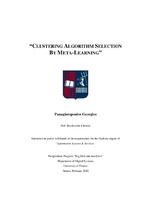| dc.contributor.advisor | Δουλκερίδης, Χρήστος | |
| dc.contributor.author | Παναγιωτόπουλος, Γεώργιος | |
| dc.date.accessioned | 2020-02-25T08:53:40Z | |
| dc.date.available | 2020-02-25T08:53:40Z | |
| dc.date.issued | 2020-02 | |
| dc.identifier.uri | https://dione.lib.unipi.gr/xmlui/handle/unipi/12630 | |
| dc.identifier.uri | http://dx.doi.org/10.26267/unipi_dione/53 | |
| dc.description.abstract | Η συσταδοποίηση δεδομένων είναι μια προσπάθεια ομαδοποίησης μιας βάσης δεδομένων σε ομάδες αντικειμένων βασισμένες στις ομοιότητες των εν λόγω αντικειμένων. Η αναζήτηση μιας ποιοτικής λύσης μπορεί να γίνει μια περίπλοκη διαδικασία λόγω απουσίας της επιτήρησης. Αυτή τη στιγμή υπάρχει ένα ευρύ φάσμα αλγορίθμων ομαδοποίησης και μπορεί να είναι μια αργή και δαπανηρή διαδικασία για την επιλογή του καλύτερου για ένα δεδομένο πρόβλημα. Για κάθε σύνολο δεδομένων που σχετίζεται με προβλήματα ομαδοποίησης, υπάρχει μια εξαντλητική διαδικασία που ζητά από έναν Data Scientist πρώτα να ελέγξει κάθε αλγόριθμο ομαδοποίησης για να βρει το πιο κατάλληλο. Ένα σύστημα που συνιστά τον αλγόριθμο ομαδοποίησης και καθοδηγεί τον χρήστη για την επιλογή του σωστού θα ήταν ένα εξαιρετικό εργαλείο που θα προσέφερε σημαντικά οφέλη στην επιστημονική κοινότητα. Ο Ράις διατύπωσε το πρόβλημα επιλογής αλγορίθμου (ASP) το 1976, το οποίο υποθέτει ότι η παραγωγή του αλγορίθμου μπορεί να προβλεφθεί με βάση τα δομικά χαρακτηριστικά του προβλήματος. Η μετα-μάθηση έχει χρησιμοποιηθεί με επιτυχία για εργασίες συστάσεων με αλγόριθμους. Χρησιμοποιεί την εκμάθηση μηχανών για να προκαλέσει μετα-μοντέλα ικανά να προβλέψουν τον καλύτερο αλγόριθμο ενός νέου συνόλου δεδομένων. Τα πειραματικά αποτελέσματα δείχνουν ότι η σύσταση βελτιώνεται με αυτά τα μετα-χαρακτηριστικά. Με σημαντική ακρίβεια, παρουσιάζεται ότι ένα σύστημα θα μπορούσε πράγματι να συστήσει έναν αλγόριθμο ομαδοποίησης για ένα "άγνωστο" σύνολο δεδομένων μόνο εξετάζοντας πρώτα τα μετα-χαρακτηριστικά του. Τέλος, αυτή η Διπλωματική εξετάζει τη συνάφεια με τη σύσταση κάθε μετα-χαρακτηριστικού. | el |
| dc.format.extent | 70 | el |
| dc.language.iso | en | el |
| dc.publisher | Πανεπιστήμιο Πειραιώς | el |
| dc.title | Clustering algorithm selection by meta-learning | el |
| dc.type | Master Thesis | el |
| dc.contributor.department | Σχολή Τεχνολογιών Πληροφορικής και Επικοινωνιών. Τμήμα Ψηφιακών Συστημάτων | el |
| dc.description.abstractEN | Data clustering attempts to classify a database into object groups based on the similarities between the objects in question. The quest for a good-quality solution can become a complex process because of its unsupervised existence. There is currently a wide range of clustering algorithms, and it can be a slow and expensive process to select the best one for a given problem. For every dataset that is related to clustering problems, there is an exhaustive procedure that requests from a Data Scientist firstly to test each clustering algorithm to find the most suitable one. A system that recommends the clustering algorithm and guides the user for selecting the right one would be a great tool that would provide significant benefits to the scientific community. Rice formulated the Algorithm Selection Problem (ASP) in 1976, which postulates that the output of the algorithm can be predicted based on the structural features of the problem. Meta-learning has been used successfully for recommendation tasks with algorithms. It uses machine learning to induce meta-models capable of predicting the best algorithm of a new dataset. Experimental results show that the recommendation improves with these meta-attributes. With a significant accuracy, it is presented that a system could indeed recommend a clustering algorithm for an “unknown” dataset only by examining its meta-attributes firstly. Also, this Master Thesis discusses the relevance to the recommendation of each meta-feature. | el |
| dc.contributor.master | Πληροφοριακά Συστήματα και Υπηρεσίες | el |
| dc.subject.keyword | Clustering | el |
| dc.subject.keyword | Data characterization | el |
| dc.subject.keyword | Meta-learning | el |
| dc.subject.keyword | Algorithm ranking | el |
| dc.subject.keyword | Algorithm selection | el |
| dc.subject.keyword | Meta-knowledge | el |
| dc.date.defense | 2020-02-21 | |


